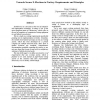364 search results - page 5 / 73 » Privacy Requirements Implemented with a JavaCard |
149
click to vote
INFOCOM
2012
IEEE
13 years 5 months ago
2012
IEEE
—Localization techniques that allow inferring the location of wireless devices directly from received signals have exposed mobile users to new threats. Adversaries can easily col...
127
click to vote
ESORICS
2012
Springer
13 years 5 months ago
2012
Springer
Abstract. Given the requirements of fast processing and the complexity of RF ranging systems, distance bounding protocols have been challenging to implement so far; only few design...
112
click to vote
ICPR
2008
IEEE
16 years 4 months ago
2008
IEEE
In this paper we present preliminary work implementing dynamic privacy in public surveillance. The aim is to maximise the privacy of those under surveillance, while giving an obse...
134
click to vote
WISA
2004
Springer
15 years 8 months ago
2004
Springer
In implementing cryptographic algorithms on limited devices such as smart cards, speed and memory optimization had always been a challenge. With the advent of side channel attacks,...
111
Voted
IEEEARES
2007
IEEE
15 years 9 months ago
2007
IEEE
E-democracy is a necessity in this era of computers and information technology. E-voting is one of the most significant parts of e-democracy, which refers to the use of computers ...




